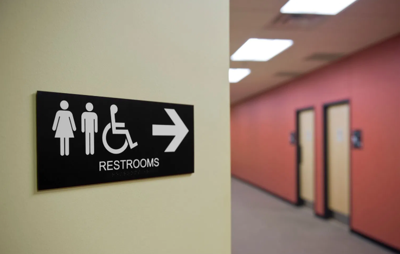COLUMBIA — A transgender student in Berkeley County will be allowed to use the boys’ bathroom this school year, despite a state law that says otherwise, a federal appeals court decided.
The student, identified only as John Doe in the lawsuit, is suing the state over a clause initially inserted in the budget last year. It puts school districts at risk of losing 25% of their state aid if they let transgender students use multi-occupancy bathrooms and locker rooms that align with their gender identity.
Budget clauses carry the same legal weight as permanent state law. They’re technically one-year laws, but unless legislators vote to take them out, they carry over indefinitely. Legislators made no attempt to remove the rule, titled “student physical privacy,” from the budget that took effect July 1.
Last week’s court ruling applies only to the student — now a high school freshman — as his case continues to move through the appeals process.
Attorneys for the family had initially asked a judge to block the law entirely, allowing an estimated 3,000 transgender students across the state to use the bathroom of their choosing. But that request was denied last month.
Due to being bullied, the student left his middle school last September. After nearly a year of homeschooling, the ninth grader “cannot wait for relief,” his attorneys wrote in their renewed request to exempt him from the rule.
“As a new school year approaches, his family is now forced to choose between two agonizing options: send John back to public school, where he will experience discrimination, including discipline, or keep him home, where he will continue to miss out on the academic and developmental benefits of an in-person education,” reads the request dated July 10.
The student’s parents opted to send him back to public school. He began ninth grade last Wednesday, one day after the ruling required his Berkeley County high school to let him use the boys’ bathroom, according to legal filings.
The court’s Aug. 12 decision “is a powerful affirmation that every student deserves to be treated with respect and humanity,” said Ronald Patane, board chair of LGBTQ+ rights group Alliance for Full Acceptance, in a statement. “We are grateful the court recognized this young person’s right to exist and learn as themselves.”
After the budget rule took effect last summer, administrators at Cane Bay Middle School in Summerville told the transgender student when classes started that he needed to use the girls’ restroom or the single-stall bathroom in the nurse’s office, according to legal filings.
No student had complained about the student using the boys’ bathroom, according to legal filings.
But the budget clause put Berkeley County School District at risk of losing more than $74 million if administrators didn’t comply, according to state Department of Education data.
When the student continued using the boys’ bathroom, he received a daylong suspension, with the threat of expulsion. To enforce the rule, teachers began monitoring which bathroom the student used, according to the lawsuit.
Other students began bullying the student over his gender identity, causing him to drop out of school and enroll instead in online classes, which he often skipped because he wasn’t engaged with his online courses, his attorneys said.
The student’s parents have been homeschooling him. But he missed the social parts of in-person public school, leading them to reenroll him despite concerns that he wouldn’t be able to use the bathroom of his choosing, according to legal filings.
In their response, the state and school district wrote that the student’s problems were due to disobeying the directive. The district offered the student an alternative, but he chose not to use it, the attorneys argued.
They also argued any bullying wasn’t due to the budget clause. The student had been open about his transgender identity, so his classmates already knew. The bathroom question didn’t reveal anything, according to state and district attorneys.
Attorneys for the student and his family argued the budget clause violated transgender students’ constitutional rights to equal protection, as well as federal laws that prohibit discrimination. The attorneys pointed repeatedly to a 2020 case out of Virginia, in which the 4th Circuit Court of Appeals upheld a lower court’s ruling allowing a transgender student to use the bathroom and locker room of his choice.
But in a July 23 order, a federal judge declined to block South Carolina’s law, citing recent and upcoming rulings from the U.S. Supreme Court.
In June, the high court upheld a Tennessee law banning gender-transitioning medical treatments for transgender minors. That brought into question how judges should consider all cases involving transgender youth, U.S. District Judge Richard Gergel wrote last month.
And the U.S. Supreme Court agreed to consider a West Virginia case asking whether transgender students should be able to play sports on the team of their choosing, which could further complicate matters, Gergel wrote.
Justices’ decision on that case “has the potential of bringing clarity and providing guidance” as to how to proceed in the South Carolina case, Gergel wrote. Any decision in the meantime could lead to a “‘yo-yo’ effect,” in which the courts go back and forth based on various rulings, he continued.
Last week’s decision by the 4th Circuit Court of Appeals overturned Gergel’s decision for the Berkeley County student only. A full explanation for the decision is pending. It has not yet been filed, according to court documents.
Sen. Wes Climer, who proposed the budget clause, said he was hopeful the U.S. Supreme Court would overturn the appeals court’s decision, or that the court might change its mind.
“The 4th Circuit’s decision is disappointing, but at least it is narrow in its application,” the Rock Hill Republican said.
Climer said he proposed the budget clause to protect students, particularly girls, from having to share a bathroom or locker room with a classmate who’s biologically different. That’s “basic common sense,” he said.
The rule applies to multi-stalled school restrooms and places where students undress, to include “changing facilities” in gyms. It also specifies that during overnight school trips, students of different genders can’t sleep in the same room or use the same multi-occupancy bathroom — unless they’re siblings.
When legislators return to Columbia in January, Climer plans to renew a push for a bill that would make the budget clause permanent state law, he said.
SC Daily Gazette is part of States Newsroom, a nonprofit news network supported by grants and a coalition of donors as a 501c(3) public charity. SC Daily Gazette maintains editorial independence. Contact Editor Seanna Adcox for questions: info@scdailygazette.com.










